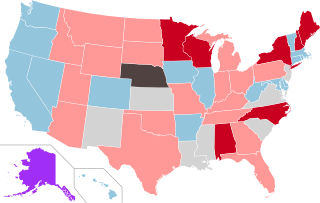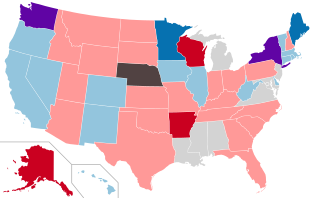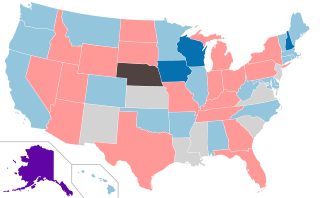
The 2008 United States elections were held on Tuesday, November 4, 2008, during the war on terror and the onset of the Great Recession. It was a considered a Democratic wave election, with Democratic Senator Barack Obama of Illinois defeating Senator John McCain of Arizona by a wide margin, and the Democrats bolstering their majorities in both chambers of Congress.

Elections in the U.S. state of New Hampshire are held at national, state and local level. The state holds the first presidential primary in the national cycle. Elections for a range of state positions coincide with biennial elections for the House of Representatives.

The 2010 United States elections were held on Tuesday, November 2, 2010, in the middle of Democratic President Barack Obama's first term. Republicans ended unified Democratic control of Congress and the presidency by winning a majority in the House of Representatives and gained seats in the Senate despite Democrats holding Senate control.

The 2002 United States elections were held on November 5, in the middle of Republican President George W. Bush's first term. Republicans won unified control of Congress, picking up seats in both chambers of Congress, making Bush the first President since Franklin D. Roosevelt in 1934 to gain seats in both houses of Congress. In the gubernatorial elections, Democrats won a net gain of one seat. The elections were held just a little under fourteen months after the September 11 attacks. Thus, the elections were heavily overshadowed by the War on Terror, the impending Iraq War.

The 2000 United States elections were held on November 7, 2000. Republican Governor George W. Bush of Texas defeated Democratic Vice President Al Gore of Tennessee in the presidential election. Republicans retained control of both houses of Congress, giving the party unified control of Congress and the presidency for the first time since the 1954 elections.

The 1992 United States elections elected state governors, the President of the United States, and members of the 103rd United States Congress. The election took place after the Soviet Union crumbled and the Cold War ended, as well as the redistricting that resulted from the 1990 census. Often considered "The Year Of The Woman," these elections brought an increased number of female politicians to Washington such as Dianne Feinstein (D-CA) and Carol Moseley Braun (D-IL). Governor Bill Clinton of Arkansas defeated incumbent President George H. W. Bush and businessman Ross Perot in the presidential election. The Democratic Party maintained their control of both chambers of Congress. This is the first Democratic trifecta since the Republican victory in the 1980 elections and the last one during the 20th century and the last one overall until 2008.

The 2010 United States state legislative elections were held on November 2, 2010, halfway through President Barack Obama's first term in office. Elections were held for 88 legislative chambers, with all states but Louisiana, Mississippi, New Jersey, and Virginia holding elections in at least one house. Kansas and New Mexico held elections for their lower, but not upper houses. Four territorial chambers in three territories and the District of Columbia were up as well.

The 1952 United States elections were held on November 4, 1952, during the Cold War and the Korean War. General of the Army Dwight D. Eisenhower won the White House in a landslide over Democratic Governor Adlai Stevenson of Illinois. Meanwhile, Republicans narrowly took control of both chambers of Congress, giving Republicans their first trifecta since the Great Depression. This is the last election until 2000 in which the Republicans held both chambers of Congress and the presidency at the same time. For the rest of the century, Republicans would often still win the presidency without full control of Congress.

The 2016 United States elections were held on Tuesday, November 8, 2016. Republican nominee Donald Trump defeated Democratic former Secretary of State Hillary Clinton in the presidential election, while Republicans retained control of Congress. This marked the first and most recent time Republicans won or held unified control of the presidency and Congress since 2004.

The 2018 United States elections were held on Tuesday, November 6, 2018. These midterm elections occurred during Incumbent Republican President Donald Trump's term. Although the Republican Party increased its majority in the Senate, unified Republican control of Congress and the White House was brought to an end when the Democratic Party won control of the House of Representatives in what was widely characterized as a "blue wave" election as Democrats also gained governorships and other state offices, and state legislative chambers as well.

The 2020 United States elections were held on Tuesday, November 3, 2020. The Democratic Party's nominee, former vice president Joe Biden, defeated incumbent Republican president Donald Trump in the presidential election. Despite losing seats in the House of Representatives, Democrats retained control of the House and gained control of the Senate. As a result, the Democrats obtained a government trifecta, the first time since the elections in 2008 that the party gained unified control of Congress and the presidency. With Trump losing his bid for re-election, he became the first defeated incumbent president to have overseen his party lose the presidency and control of both the House and the Senate since Herbert Hoover in 1932. This was the first time since 1980 that either chamber of Congress flipped partisan control in a presidential year, and the first time Democrats did so since 1948.

The 2020 United States state legislative elections were held on November 3, 2020, for 86 state legislative chambers in 44 states. Across the fifty states, approximately 65 percent of all upper house seats and 85 percent of all lower house seats were up for election. Nine legislative chambers in the five permanently-inhabited U.S. territories and the federal district of Washington, D.C. also held elections. The elections took place concurrently with several other federal, state, and local elections, including the presidential election, U.S. Senate elections, U.S. House elections, and gubernatorial elections.

The 2018 United States state legislative elections were held on November 6, 2018, for 87 state legislative chambers in 46 states. Across the fifty states, approximately 56 percent of all upper house seats and 92 percent of all lower house seats were up for election. Additionally, six territorial chambers in four territories and the District of Columbia were up as well.

The 2022 United States state legislative elections were held on November 8, 2022, for 88 state legislative chambers in 46 states. Across the fifty states, approximately 56 percent of all upper house seats and 92 percent of all lower house seats were up for election. Additionally, six territorial chambers were up in four territories and the District of Columbia. These midterm elections coincided with other state and local elections, including gubernatorial elections in multiple states.

Elections to state legislatures were held in 46 U.S. states in 2014 with a total of 6,049 seats up for election. Six territorial chambers were up in four territories and the District of Columbia.

The 2016 United States state legislative elections were held on November 8, 2016, for 86 state legislative chambers in 44 states. Across the fifty states, approximately 65 percent of all upper house seats and 85 percent of all lower house seats were up for election. Nine legislative chambers in the five permanently-inhabited U.S. territories and the federal district of Washington, D.C. also held elections. The elections took place concurrently with several other federal, state, and local elections, including the presidential election, U.S. Senate elections, U.S. House elections, and gubernatorial elections.

The 2012 United States state legislative elections were held on November 6, 2012, for 86 state legislative chambers in 44 states. Across the fifty states, approximately 65 percent of all upper house seats and 85 percent of all lower house seats were up for election. Nine legislative chambers in the five permanently-inhabited U.S. territories and the federal district of Washington, D.C. also held elections. The elections took place concurrently with several other federal, state, and local elections, including the presidential election, U.S. Senate elections, U.S. House elections, and gubernatorial elections.

The 2006 United States state legislative elections were held on November 7, 2006, halfway through President George W. Bush's second term in office. This election was a wave elections in the United States election, and saw Democrats simultaneously reclaim both houses of Congress and pick up six governorships. Elections were held for 90 legislative chambers, with all states but Louisiana, Mississippi, New Jersey, and Virginia holding elections in at least one house. Kansas, New Mexico, and South Carolina held elections for their lower, but not upper house. Four territorial chambers in three territories and the District of Columbia were up, including the newly created territorial legislature in the U.S. Virgin Islands.

Elections to state legislatures were held on November 2, 2004, alongside other elections. Elections were held for 85 legislative chambers, with all states but Louisiana, Mississippi, New Jersey, Alabama, Maryland, and Virginia holding elections in at least one house. Michigan and Minnesota held elections for their lower, but not upper houses. Six chambers in three territories and the District of Columbia were up as well.

The 2002 United States state legislative elections were held on November 5, 2002, halfway through President George W. Bush's first term in office. This was a unique election in which the incumbent Republican party performed surprisingly well for a midterm election. Elections were held for 91 legislative chambers, with all states but Louisiana, Mississippi, New Jersey, and Virginia holding elections in at least one house. Three territorial chambers in two territories and the District of Columbia were up as well.
























